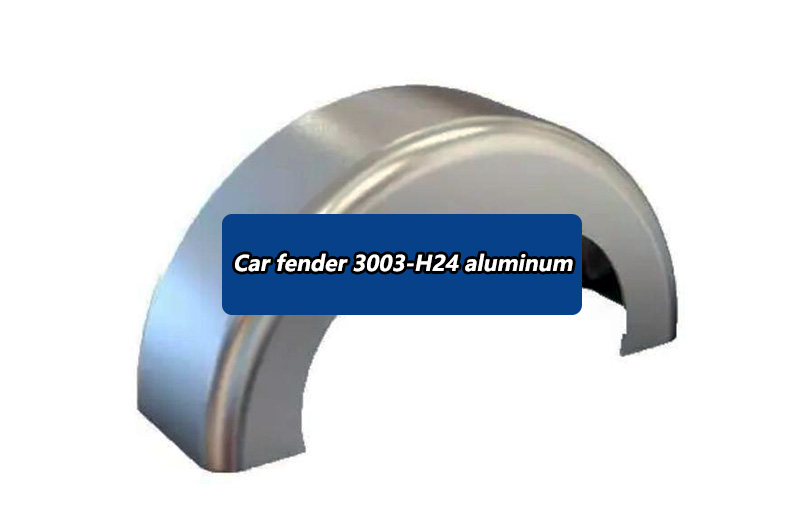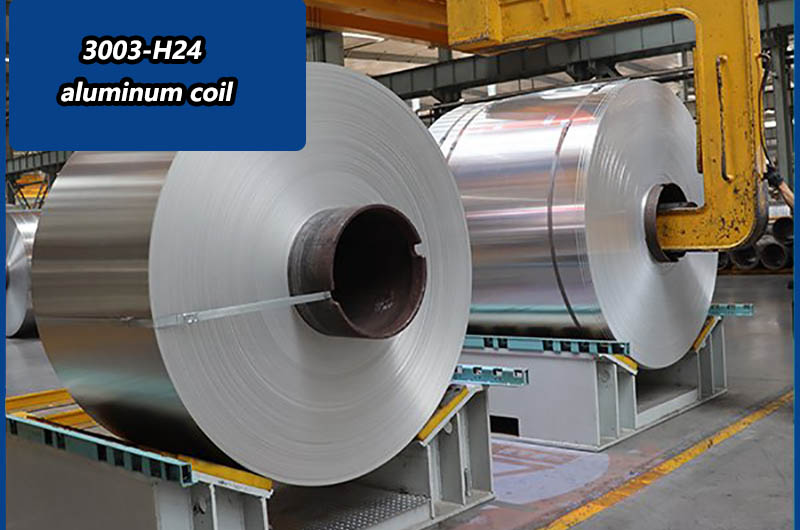Fenders are devices installed near the tires of Car and Truck vehicles. Their main purpose is to prevent mud, rain and debris from the road from splashing onto the vehicle body.
The fenders are usually installed behind the four tires of the car, the front two are fixed on the left and right lower sills, and the rear two are fixed on the rear bumper.
Fenders are typically made from a variety of materials, including plastics, rubber, and metals, with 3003 aluminum alloy being a common choice because it's lightweight, corrosion-resistant, and easy to machine into the desired shape.

What is the function of car fenders?
- 1. Fenders can protect the mechanical structure and prevent rust.
- 2. Fenders can also protect car paint.
- 3. The fender can block sand and rain.
- 4. Can reduce the number of car washes.
The strength of 3003 aluminum alloy aluminum coils in different states may be different. 3003-H24 was chosen because it has moderate strength in a semi-rigid state and meets the requirements for fenders.
3003-H24 aluminum alloy: This is an aluminum-manganese alloy with good corrosion resistance and is suitable for manufacturing some products that require good formability and strength, such as fenders. "H24" indicates the hardness state of the alloy, that is, semi-hard state.
Car and truck fender 3003-H24 aluminum coil performance
| roperty | Value |
|---|---|
| Tensile Strength | 140-180 MPa |
| Yield Strength | Approximately 115 MPa |
| Elongation | 10-20% |
| Hardness | Relatively low (due to partial annealing in H24 temper) |
Car and truck fender 3003-H24 aluminum coil specifications
Specifications for car and truck fenders made from 3003-H24 aluminum coil may vary depending on the manufacturer, design and vehicle's specific requirements.
Typical specifications for 3003-H24 aluminum coil for car and truck fenders may include:
- Alloy: 3003-H24
- Thickness: Typically ranges from 0.5mm to 3.0mm, depending on specific application and design requirements.
- Width: Variable, depending on fender size and style, but usually in the 1000mm to 1600mm range.
- Coil Weight: Coil weight may vary depending on manufacturing process and equipment. Typically, rolls may weigh between 2 and 3.5 tons.
- Surface Finish: A smooth finish suitable for painting or other surface treatments.
- Tolerances: Precise specifications for thickness, width, and other dimensions will depend on the manufacturer and the specific application. Standard tolerances for thickness and width are typically specified based on industry standards.
- It is important to note that these are general specifications and actual specifications may vary based on manufacturer capabilities and requirements of the specific automotive application.

Car and truck fender 3003-H24 aluminum coil advantages
- Lightweight: 3003-H24 aluminum coil is a lightweight and strong material that can reduce the weight of the entire vehicle. This is important for cars and vans because reducing the vehicle's mass improves fuel efficiency and reduces stress on the suspension and other components.
- Corrosion Resistance: Aluminum alloys have very good corrosion resistance and are not easily affected by factors such as moisture, moisture, and road salt. This allows the fender to maintain its appearance and performance for longer, reducing the need for maintenance.
- Ease of processing: 3003-H24 aluminum coil is easy to process and form, and can be manufactured into various shapes that meet the design requirements of fenders. This makes the production process more flexible and can meet the needs of different models and designs.
- Recyclability: Aluminum is a recyclable material, and using aluminum fenders is in line with the principles of sustainable development. Discarded aluminum materials can be recycled and reused, helping to reduce resource waste and environmental impact.
- Appearance and texture: 3003 aluminum alloy usually has a good appearance and texture, which can increase the overall beauty of the vehicle. This is especially important for some high-end car and van models.
In general, using 3003-H24 aluminum coils to make fenders can help improve vehicle performance, reduce maintenance costs, and has certain environmental advantages. However, manufacturers often need to consider cost, performance and design requirements when selecting materials.
Car and truck fender 3003-H24 aluminum coil applications
When 3003-H24 aluminum coil is used in fenders, its thickness typically varies based on the specific vehicle model, design needs and manufacturing standards. The following are some typical thickness ranges, these values may vary in actual applications:
- Thin fender: 0.5mm to 1.2mm 3003 h24 aluminum coil, suitable for light passenger cars and some small SUVs, focusing on lightweight and fuel efficiency.
- Standard fenders: 1.2mm to 2.0mm 3003 H24 aluminum coil, suitable for most passenger cars, trucks and SUVs, providing better durability and impact resistance.
- Thick fender: 2.0mm to 3.0mm 3003 h24 aluminum coil, suitable for off-road vehicles, trucks and other models that require greater strength to provide greater protection.
These values are examples only; in practice, vehicle manufacturers and component suppliers may select appropriate thicknesses based on their specific design and performance needs. In actual applications, fender thickness may also vary due to regional differences, regulatory requirements and manufacturer preferences.
The price of aluminum car fender 3003-H24 aluminum coil is not fixed. The specific quotation should be based on the actual needs of users. Users have different thickness requirements for multiple products, and their prices are also different, and they need to be determined based on market supply and demand. analyze. In addition, the choice of manufacturer will also affect the price to a certain extent, because different manufacturers have different processing techniques, technical levels, material selection, sales methods, etc., so the quotations given by different manufacturers are also different.

